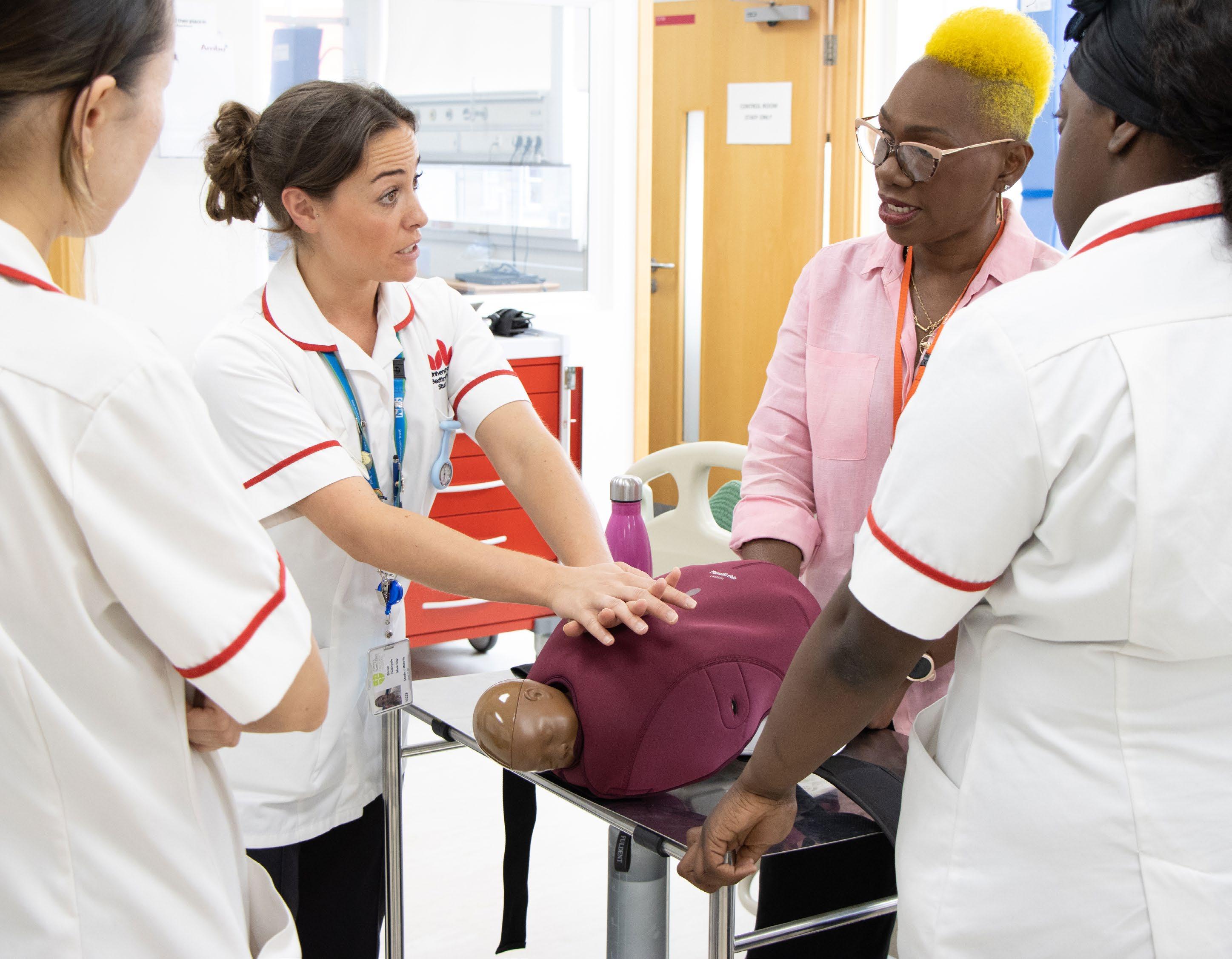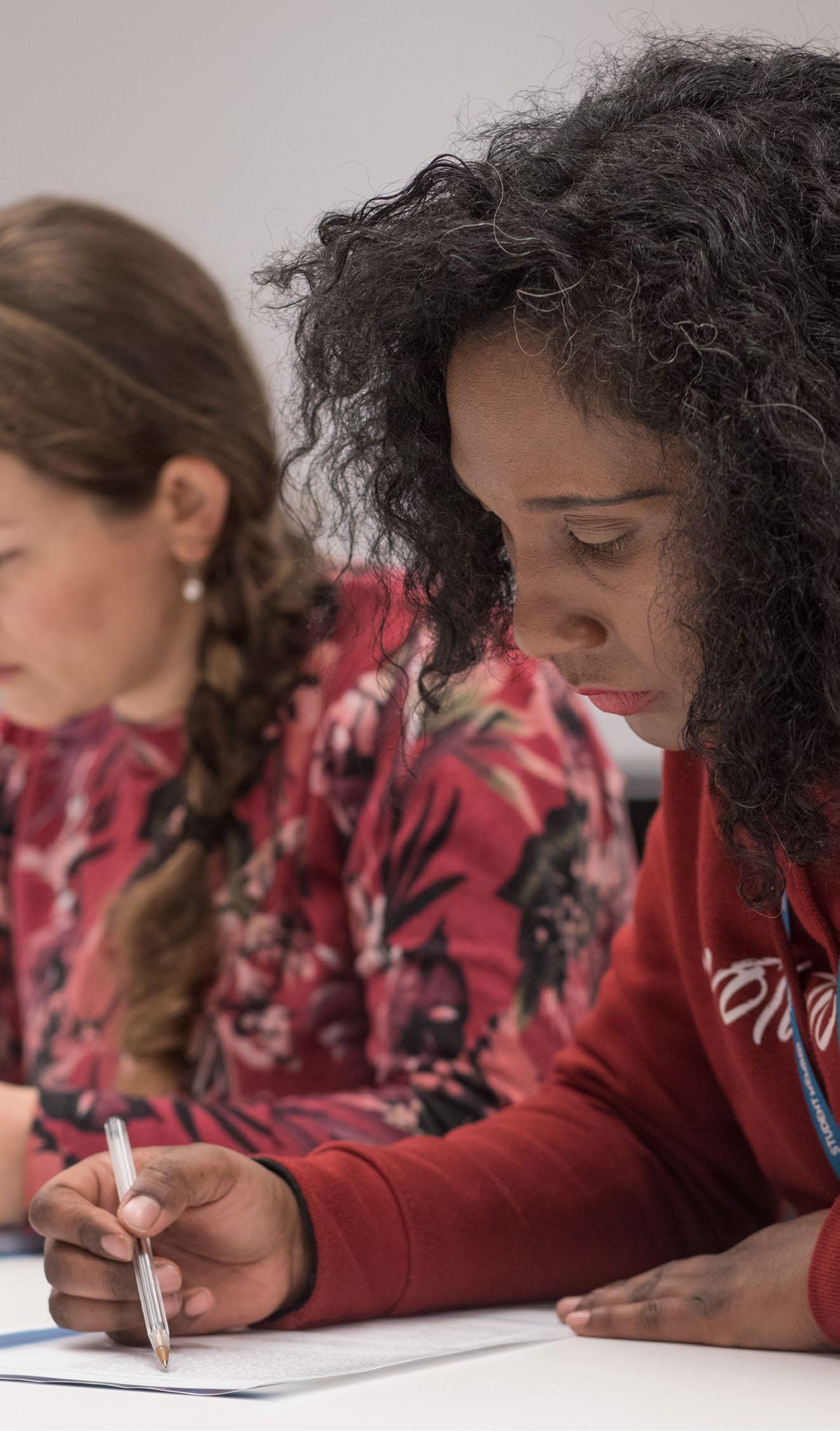










Welcome to Midwifery at the University of Bedfordshire.
We are thrilled that you have chosen to embark on this journey with us. Our mission is to provide you with the knowledge and skills necessary to become a competent and compassionate midwife. We are here to support you every step of the way. Our experienced faculty members are dedicated to helping you succeed and will provide you with a rich learning environment that fosters growth and development. We look forward to working with you and helping you achieve your dreams of becoming a midwife. Let's get started! It is a pleasure to introduce our esteemed staff members.

Firstly, Amanda Willetts is the Principal Lecturer. She is an experienced and accomplished academic with a passion for midwifery and teaching. Amanda has a wealth of knowledge and expertise in midwifery, having worked in the field for many years before moving into academia. As a Principal Lecturer, she is responsible for leading and managing the midwifery program, designing and delivering courses, and supporting students in their academic and professional development. Her dedication to her students and the midwifery profession is evident in her teaching style and her commitment to providing the highest quality education.
Next, we have Claire Bunyan, who serves as the course lead for the MSc Midwifery 2 year programme. With her extensive knowledge and research in the field of midwifery, she will challenge and inspire our graduate students to become leaders in the profession.

Course Lead MSc Midwifery
Claire Bunyan claire.bunyan@beds.ac.uk
Your personal academic tutor is Email

Last but not least, we have Meryl Dimmock, who serves as the Apprentice Coordinator for Midwifery. With her dedication and passion for nurturing and guiding our apprentices, she will ensure that they receive the highest quality education and training in midwifery. We are fortunate to have such talented and committed individuals on our team, and we are confident that they will play a key role in shaping the future of midwifery.
Student Information Desk (SiD) beds.ac.uk/sid sid@beds.ac.uk
Treehouse Community & Faith Centre
Mental Health Services beds.ac.uk/student-support/mentalwell mentalhealth@beds.ac.uk
BedsSU (student union) help@bedssu.co.uk

We are eagerly looking forward to welcoming you to the start of your academic journey at the University of Bedfordshire.
During your first week, known as Induction, you will be joining your fellow Midwifery students and will have the opportunity to get to know the course team and your classmates.
Moreover, you will be assigned a personal tutor who will guide and support you throughout your first education block. Additionally, your tutor will be available for weekly office hours and you can also arrange appointments with them throughout the course. Our goal is to provide you with continuous support and guidance throughout your studies.
The following is a typical Welcome Week schedule:
Day 2
Day 3
Welcome from key staff. Introduction to: Student Union, Library and study hub, Student support, Unions. Course plan overview, unit overviews, current student Q+A.
Introduction to BREO, Achievement and assessments explained, course and practice handbooks and StREAM. Introduction to Personal Academic Tutors (PATs), uniform policy (and ordering) and professional expectations. Campus Tour. Practice placements – meet the staff. Q+A.
Day 4 Student Union events.
For more information on joining your course, visit Begin MSc Midwifery @Beds where you will find updated info, tips and dates of your course induction week etc.
In your first year of midwifery, you will be introduced to the foundational knowledge and skills necessary for the profession. This includes studying anatomy and physiology, fetal development, and the basics of pregnancy, labour, and childbirth. You will also learn about antenatal care and the role of the midwife in promoting maternal and fetal well-being.
Additionally, you will develop clinical skills through practical training and placement in various healthcare settings. This will give you the opportunity to observe and participate in the provision of care for women and newborns under the guidance of experienced midwives.
Throughout your first year of midwifery, you will also focus on developing your communication, interpersonal, and critical thinking skills, which are essential for providing safe and effective care. The curriculum will be designed to provide a strong foundation for your future studies and prepare you for the challenges and rewards of the midwifery profession.
Universal care and human development
Public health and the accountable midwife
Midwifery care in practice
Enhancing quality and safety in midwifery
Individualised and additional midwifery care
How to find your Timetable
Information about your learning with BREO
Study Hub is the Library academic support service, a one-stop-shop for any academic, resourcing or general IT assistance to create the best assignments you can.
Visit the Library
Begin@Beds Start your student journey
Thrive@Beds My Beds Life
Succeed@Beds Careers and Employability Service

As you commence your professional course, it will be necessary for you to undergo an enhanced DBS check and provide ID documentation, as well as complete an occupational health assessment. In addition, you will need to carefully read and sign the professional studies contract that aligns with the NMC standards of Conduct, Performance, and Ethics. This contract will serve as a guide throughout your three-year degree course.
During your course, you will have the opportunity to undergo clinical placements with one of our practice partners. Furthermore, you will be provided with various opportunities to gain experience in different areas of midwifery practice, which will be instrumental in your journey to becoming a registered midwife.
Link Lecturer at each NHS Trust:
• Bedford NHS Trust
Claire Bunyan
Clayron Dyer
• Luton NHS Trust
Eirini Vounatsou
Lauren Hutton
• Milton Keynes
Joanna Swanton
• Buckinghamshire NHS Trust
Jane M’Nkanata
Edel Clare
Carolyn Rooth
• West Herts Hospital Trust (Watford)
Kate Washington


The course assessment strategy is closely aligned to the teaching and learning strategy which is designed to:
• have an immediate relevance to practice;
• draw on expertise-by-experience;
• foster active learning and be learner-centred in approach.
A distinct feature of the course is the range of assessment tasks that can have an immediate impact in practice. This helps put into practice what you are learning in university and increases your self-confidence.
There are a number of different types of assessments which are used throughout the course:
Essays
Leaflets
Posters
Reflections Presentations
OSCEs (Objective Structured Clinical Examinations)
In class test
MORA (Midwifery Ongoing Record of Achievement)
Practice documents
Research proposals
There are a few ways in which midwifery students can prepare themselves for the first week of their course:
1 Read up on the course syllabus and requirements – familiarise yourself with the course outline and expectations, including the learning outcomes, assessment criteria, and course materials. This will help you understand what is expected of you and how you can best prepare for the course.
2 Connect with your peers – join online forums or social media groups to connect with your fellow students. This can be a great way to get to know others in your course and to share resources and study tips.
3 Brush up on your foundational knowledge – review key concepts in anatomy and physiology, fetal development, and the basics of pregnancy, labour, and childbirth. This will help you feel more confident and prepared for the coursework.
4 Organise your schedule – take the time to organise your schedule and create a study plan that works for you. This will
help you manage your time effectively and ensure that you are able to balance your coursework with other commitments.
By taking these steps, you can help ensure that you are ready for the challenges and opportunities of your first week on the midwifery course.
• Midwifery – UCAS Subject Guides
• Your first placement ABOUT THE CAMPUS
• Aylesbury
• Luton
• Here is a message from Blaise, one of our recent students

As a first-year midwifery student, your journey will commence with a 6-week in-person teaching block followed by 2 weeks of preparation for starting practice – including trust induction, study days and online learning. This will equip you with the necessary skills and knowledge to begin your practice placement, which is scheduled to start in week 9. During your university block, our placement partners will visit you and provide you with your placement schedule beforehand, allowing you to plan your time effectively.
After the Christmas break, you will return to university for a 4-week teaching block, followed by further placement until the hand-in date, with annual leave scheduled in between. In the academic year, you will be required to complete 637.5 hours of practice, which translates to 37.5 hours per week in placement, typically comprising of 3 long shifts per week depending on the hospital shift patterns.
9am
10am
Mon Tue Wed Thu Fri
Guided study
Guided study
Guided/ independent study
Guided study
Professional identity
Academic skills
Human structure function and exercise
11am 12pm LUNCH
Academic skills
1pm LUNCH LUNCH LUNCH
Professional identity
Guided/ independent study
Human structure function and exercise 2pm
Guided/ independent study 3pm 4pm
Academic skills
Manual handling
ADL suite
Guided/ independent study
Guided/ independent study 5pm
Guided/ independent study

When do I find out which placement area I have been allocated?
Our goal is to promptly provide students with their placement locations as soon as they are confirmed by the Trusts. During Welcome Week, you will typically have the opportunity to meet your practice educators, enabling you to ask questions, plan a visit, and become acquainted with the team.
What happens if I miss class due to being unwell or having difficulties with childcare ?
We recognise that everyone may encounter challenges from time to time, and our goal is to be adaptable. We encourage you to communicate any persistent issues with your Personal Academic Tutor or Unit Lead.
Is there someone who can help me with my assessments?
The team of lecturers is readily available to assist you with the theory-based course material, and you may wish to arrange a one-on-one tutorial with your Unit Lead. If you require additional time to finish an assignment, you can reach out to Student Engagement and Mitigation (SEAM), who handle assessment extensions. Their email is mitigation@beds.ac.uk
Will I be able to practise before I attend placement and work with actual patients?
Certainly. Your weekly teaching plan will include scheduled simulation-based learning, which will serve as an outstanding preparation for your placement. Our simulation suite, equipped with a sim mum, sim baby and other practical equipment will provide you with diverse learning opportunities as it can also serve as a ward, A&E, and maternity area.
Is there somewhere for me to get support if I have a learning difference such as Dyslexia?
Certainly! There are numerous resources at your disposal, and you may qualify for a Learning and Teaching Agreement, which outlines any necessary accommodations for classroom instruction and assessments.
Are there clubs and activities
I can get involved with?
Certainly! The UoB Student Union will offer comprehensive information regarding sports clubs, activities, and events accessible to all students. To learn more, please visit bedssu.co.uk

Simulation suite beds.ac.uk/simulation
Learning Difference support information beds.ac.uk/student-support/disabilities2
If you are starting your midwifery course or any other new endeavour, remember to stay curious, open-minded, and committed to your goals. Take advantage of the resources available to you, including your lecturers, mentors, and support staff. Do not be afraid to ask for help when you need it, and always strive to learn and grow.
Also, remember to take care of yourself both physically and mentally. Prioritise self-care activities, maintain a healthy work-life balance, and reach out to friends, family, or professionals if you are struggling.
Lastly, keep in mind that success is not always measured by grades or accomplishments, but by the personal growth and fulfilment, you experience along the way. Good luck on your journey!
The sense of camaraderie and teamwork with other healthcare professionals.
The opportunity to work in a supportive and caring environment.
The sense of purpose and fulfilment that comes with making a difference in people’s lives.
The opportunity to help bring new life into the world. Building strong relationships with expectant mothers and their families.
Being a part of a team that provides critical care to newborns and their mothers.
The satisfaction of seeing a successful birth and a healthy baby. The ability to provide emotional support to mothers and their families during a challenging time. The diversity of the job, with different challenges and experiences each day.
The ongoing learning and development that comes with working in healthcare.